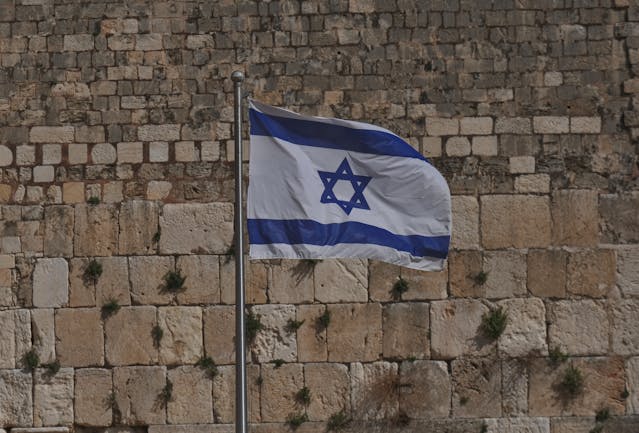
How did Israel end up where it is? The British government had the idea to create a Jewish homeland roughly where the Land of Israel used to be. To do that, they had to break up Palestine. The UN adopted the plan and Israel declared statehood on May 14th, 1948.
The name “Israel” was chosen in 1948, when the country declared statehood. It comes from “Israel”, who was a character in the bible. In Genesis 32, there is a character called Jacob, who is renamed Israel after he undergoes and passes through a struggle. The name is passed on to the 12 tribes of Israel, who become “children of Israel”. Jacob (Israel) was the son of Isaac, who was the son of Abraham, who is the father of Judaism. Interestingly (for me), Isaac’s line founded Judaism and Isaac’s brother Ishmael founded Islam. The bible also says where the land of Israel is and that Jerusalem is its capital. The Israelites were said to be enslaved by the Egyptians, and when they were freed, God gave them the land of Canaan. This area is roughly where modern-day Israel is and is why the area was chosen.
Over the next several thousand years, the land of Israel was conquered by different empires and the Israelites were forced off it. By 1517, the area where Israel is now, along with most of the Middle East, was part of the Ottoman Empire. The Ottoman was very powerful until it started to decline in the late 19th century. By the time of World War 1, it had almost no power and was dissolved in 1922. This left a void in the area, and Britain entered. Britain and France had agreed that they would take over most of the territory that had been part of the Ottoman Empire. They claimed that they would help prepare the territories for self-government, but the reason was probably more political. Both countries still had empires and were trying to prevent each other from getting more land. Britain also wanted to protect its trade route with India.
During World War 1, Arthur James Balfour, the foreign secretary of Britain, had written a letter supporting the creation of a Jewish homeland in Palestine. It is impossible to be sure how much Britain believed in this. They may have just said it to drum up support for the war effort because they needed to draw America in. A lot of Jewish people lived in America. They were also very careful and said “a national home for the Jewish people”. They didn’t use the word “state”.
After World War 1, Britain took control of the Palestine area from the Ottoman Empire and Jewish people started to immigrate in the hope that they would have a land. The Arabs that lived there were not happy with British rule or the increased immigration. In 1922, the newly formed UN gave Britain permission to govern Palestine, with the understanding that they would make a national home for the Jewish people and also one for the Arabs that lived in the area. Britain was given until 1949 to make this happen.
More Jewish people immigrated to the area, causing problems with the Arab populations that lived there. With the rise of Nazism, the number of immigrants increased until it was 250,000 by 1939. The Arabs revolted and there was a lot of fighting. The British army were able to put it down, but a lot of people died.
Jewish people and Arabic people have a long history of tension. They both consider Jerusalem to be their holy city and they both have many holy places in the area. Creating a Jewish country in the middle of Arabic land was a difficult proposition. After the revolt, Britain decided to close Palestine to Jewish immigration. Most other countries had also closed themselves as well, which was one of the reasons why so many Jewish people were unable to escape from Europe during the war.
After World War 2 was over, immigration into Palestine was still closed, so Jewish people started to move overland and sneak into the country illegally. The British imprisoned the ones they caught in camps. Many of the people they arrested were survivors of the Holocaust, including many children. Britain wanted to make a state for Israeli people and a state for Arab people, but they realized that wasn’t going to be possible. The Israelis were angry at British occupation and lack of free immigration. They started to fight against the British troops. The Arabs were angry at the British for their occupation and allowing the Jewish people in. They fought the British as well. In 1947, the UN voted to partition Palestine and create an Israeli state and a Palestinian state. After the world learned about the Holocaust in Nazi Germany, there was a lot of sympathy for an Israeli state. The Arab side opposed this. By the end of 1947, the violence against British forces was escalating and in May 1948, they withdrew, leaving Israeli and the Arabic nations to fight it out for themselves. They withdrew on May 15th and Israel declared statehood one day earlier, on May 14th. And that is just the beginning of what came next, but that is what I learned today.
Photo by Leon Natan: https://www.pexels.com/photo/photo-of-the-national-flag-of-israel-6851497/
Sources
https://www.quora.com/Why-did-Britain-take-over-the-Ottoman-Empire-s-colonies-after-World-War-I
https://www.gotquestions.org/Jews-Arabs.html
https://www.aljazeera.com/features/2018/4/10/how-britain-destroyed-the-palestinian-homeland
https://www.gotquestions.org/life-Abraham.html
https://fr.bibleodyssey.com/articles/israel-as-a-person-people-and-place/
https://en.wikipedia.org/wiki/State_of_Palestine
https://unctad.org/topic/palestinian-people/The-question-of-Palestine
https://en.wikipedia.org/wiki/History_of_the_Israeli%E2%80%93Palestinian_conflict
https://history.state.gov/milestones/1945-1952/creation-israel
https://www.history.com/topics/middle-east/history-of-israel
https://en.wikipedia.org/wiki/United_Nations_Partition_Plan_for_Palestine
https://en.wikipedia.org/wiki/Balfour_Declaration
